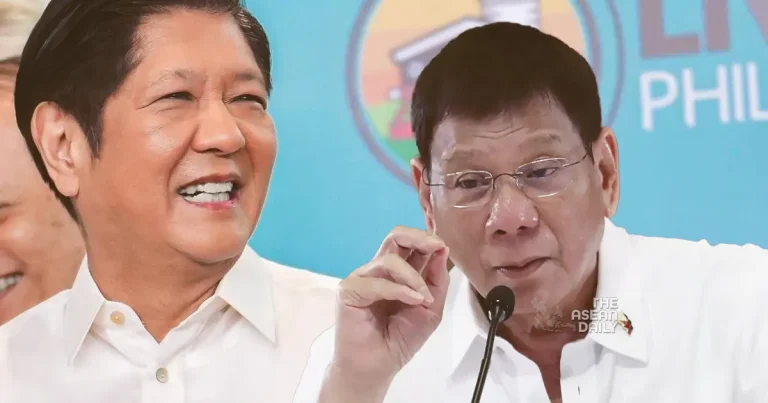2-2-2024 (MANILA) The once-formidable alliance between Philippine President Ferdinand Marcos Jr. and his predecessor Rodrigo Duterte has crumbled this week amidst accusations of drug use, escalating tensions that could jeopardize Marcos’s reform efforts and destabilize the country’s political landscape.
The highly anticipated rift between two of the Philippines’ most influential families, which propelled Marcos and Duterte’s daughter, Sara, to power in 2022, has unfolded sooner than expected, surprising analysts with its swiftness.
“This marks a point of no return,” remarked Jean Encinas-Franco, a political science professor at the University of the Philippines, highlighting the intensity of the exchanges between the two families.
Sebastian Duterte, the former president’s son and mayor of Davao city, has called for Marcos’s resignation, citing flawed policies such as his pro-US foreign stance, which he claims “endangers the lives of innocent Filipinos.”
“The opportunistic political coalition was bound to unravel,” noted Temario Rivera, chairman of the Centre for People Empowerment in Governance think-tank. “The dissolution appears to be occurring earlier than anticipated.”
Despite attempts to downplay tensions, Marcos insisted on Tuesday (Jan 30) that the coalition remained intact, affirming Sara Duterte’s role as education minister.
However, political analysts warn that the rift could imperil Marcos’s ambitious economic growth plans, job creation initiatives, infrastructure overhaul, and military reinforcement.
“A breakdown in the formal alliance risks fostering new rifts within the military, posing significant governance and stability challenges,” cautioned Rivera.
A Tumultuous Path to Power
The convergence of the Marcos and Duterte families in 2022, with Sara Duterte as Marcos’s vice-presidential running mate, facilitated Marcos’s resurgence and secured victory for the disgraced Marcos dynasty.
Ferdinand Marcos Sr., a two-decade authoritarian president, was overthrown in the 1986 “people power” uprising amid allegations of amassing over US$10 billion (S$13.4 billion) in wealth during his rule.
Yet, fissures in the Marcos-Duterte relationship surfaced early on.
Marcos pivoted away from Duterte’s pro-China stance, realigning with the US amidst China’s assertiveness in the South China Sea and near Taiwan.
He emphasized a 2016 arbitral ruling affirming Manila’s territorial claims in the South China Sea, a stance diverging from Duterte’s conciliatory approach towards China.
Moreover, Marcos sought to revive peace talks with communist rebels, a move dismissed by Sara Duterte as an “agreement with the devil.”
The rift deepened in November when Marcos expressed intentions to rejoin the International Criminal Court, a move opposed by Duterte, who withdrew the Philippines’ membership in 2018 amid an investigation into his war on drugs.
Marcos’s support for constitutional amendments aimed at easing business regulations and attracting investors further strained relations, with Duterte accusing him of seeking to prolong his stay in power.
Duterte cautioned Marcos against meeting his father’s fate of fleeing the country if he pursued constitutional changes introduced after the 1986 revolution.
Erupting Conflict
The alliance unraveled publicly on Sunday when Duterte labelled Marcos a “drug addict” during an anti-charter change rally, attended by his daughter.
In retaliation, Marcos insinuated that Duterte’s past use of fentanyl, a pain relief drug, may have impaired his judgment.
Analysts speculate that the public feud is linked to the upcoming 2028 presidential race, where Sara Duterte is expected to contend, with strong public support evident in a 2023 Social Weather Stations survey.
“It’s going to be open warfare this year,” predicted Ronald Llamas, a seasoned political analyst and former presidential adviser.
The Philippines is poised for mid-term elections in 2025, where the outcome could influence Marcos’s legislative agenda and political alliances.
As Marcos’s endorsed candidates face mid-term scrutiny, his legislative priorities hang in the balance, risking political gridlock if loyalties waver, analysts warn.




